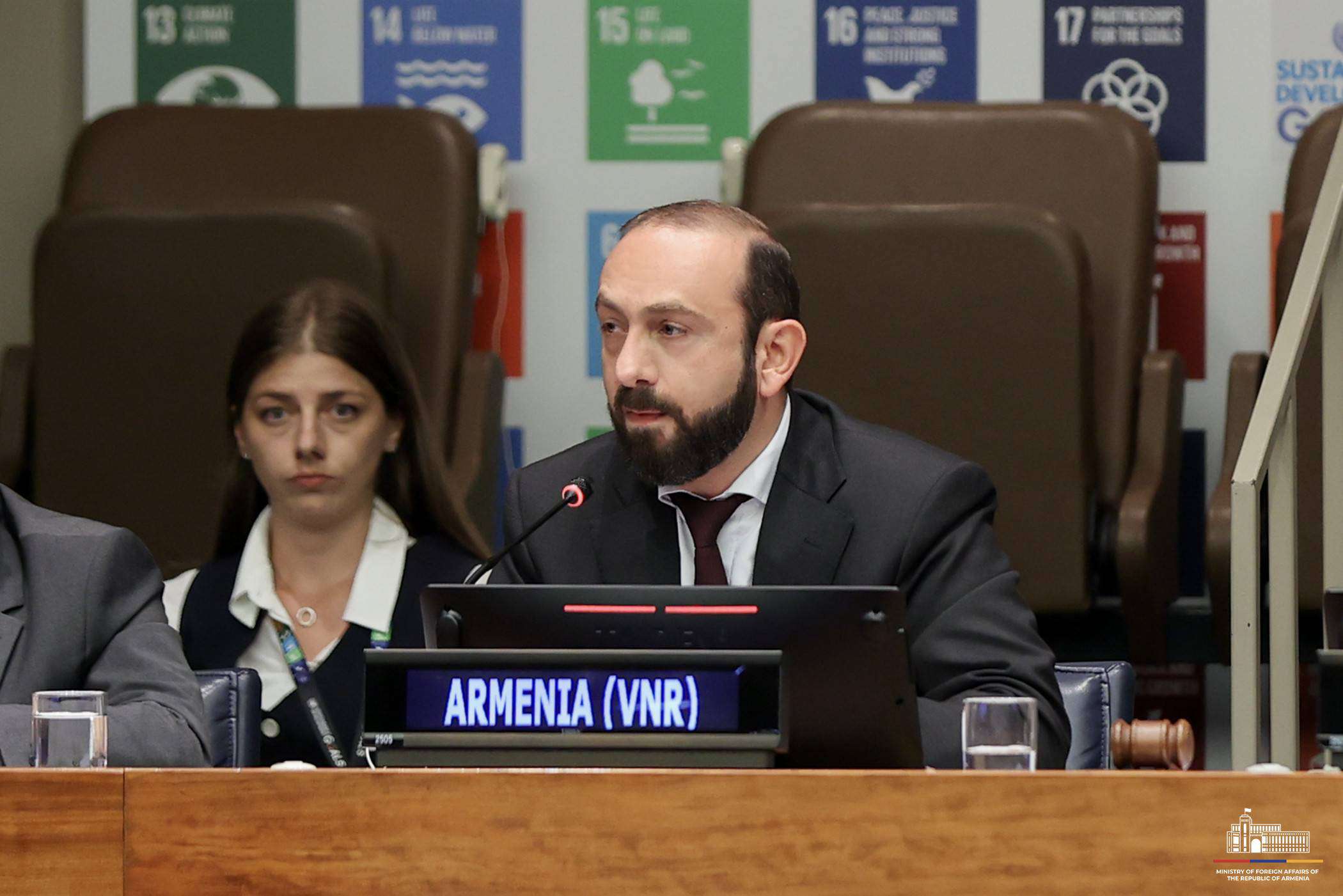On July 15, in New York, the Minister of Foreign Affairs of the Republic of Armenia, Ararat Mirzoyan, presented the third voluntary national report summarizing the progress made in implementing the UN sustainable development agenda and goals and targets.
Stroev, we present the RA Foreign Minister's speech in full.
After the speech, representatives of other presenting countries with a wide geographical coverage, particularly from Germany, India, Lithuania, Mexico, Lebanon, Uzbekistan, as well as representatives of civil society, responded and asked questions. Minister Mirzoyan answered the questions of interest to his colleagues within the specified period.
"Dear Chairman,
Ladies and gentlemen,
I am glad to speak at this High Level Political Forum and present the third voluntary national report of Armenia.
The previous four years were unprecedented due to the pandemic, aggression, ethnic cleansing, and refugee crisis. Although these negative developments could undermine efforts to implement the 2030 Agenda, Armenia has proven that it is possible to deliver on the promise of the Sustainable Development Goals and create hope for progress, prosperity, and peace.
Therefore, Armenia's 3rd National Report is a path to resilience, humanitarian action, and sustained efforts to transform sustainable development goals into real benefits and build better, with significant impact on peace and justice in the country and the region. It is a real-time example of the impact of the link between humanitarian action, development and peace on the implementation of the 2030 Agenda.
Let me briefly introduce each of the humanitarian, development and peace components, the relationship and interaction between them in the pursuit of the Sustainable Development Goals.
Humanitarian actions. As Armenia grappled with the effects of the COVID-19 pandemic, Armenia dealt with another disaster. Azerbaijan's large-scale military aggression against Nagorno-Karabakh in the fall of 2020, a 10-month blockade, famine, and ethnic cleansing in 2023 claimed thousands of lives and led to massive destruction and a humanitarian crisis. Over 115,000 forcibly displaced refugees, the entire indigenous population of the region, were forced to flee to Armenia within days under threat of persecution and atrocities.
On October 26, 2023, by the decision of the RA government, temporary protection status was granted to refugees from Nagorno Karabakh, providing them with available social protection mechanisms, health, educational and psychological services. Government efforts and solidarity among Armenian society have played an important role in addressing the immediate and mid-term needs of refugees. More than USD 160 million has already been spent from the national budget to provide housing, food and other priority needs through direct cash assistance and other similar mechanisms. At the current stage, the Government has launched a long-term housing program and is also taking concrete steps to address the employment issues of refugees, 1/3 of whom - teachers, health workers, entrepreneurs - have already found employment or started their own businesses.
In addition to the above-mentioned challenges, in 2021 and 2022 the Republic of Armenia faced large-scale military aggression and occupation of its sovereign territories, which in turn led to internal displacement and gross violations of the rights of people living in the border regions.
When that report was being finalized, Armenia experienced another unprecedented environmental disaster. In May 2024, severe floods in the Lori and Tavush regions of Armenia significantly affected 9 urban and 28 rural communities, great damage was done to civil infrastructures.
Mr. Chairman,
Development. Despite all these difficulties, Armenia maintained a steady pace of progress and sustainable development. Institutionally, the main priorities of Armenia's development are formulated in the strategy of transformation of Armenia until 2050, which is aimed at eradicating poverty, promoting food security, human development and environmentally friendly economic growth.
Important economic reforms, effective fiscal policy and inflation targeting have contributed to the steady growth of the economy with up to double-digit GDP and the overall improvement of the socio-economic picture of the country. This enabled the government to fulfill its promise to leave no one behind. In this context, the creation of an emergency social support system has been an important initiative. The system, while continuing to provide social assistance to the most vulnerable groups, aims to enable them to achieve self-sufficiency through income generation.
The overall unemployment rate in Armenia decreased in 2020-2022, from 18.2 percent in 2020 to 13.5 percent in 2022, and the percentage of the population below the national poverty line decreased from 1.1 percent to 0.8 percent, bringing thousands of people out of poverty..
Armenia is committed to building a knowledge-based and inclusive economy. Highly educated and talented population has always been the competitive advantage of our country. Guided by this approach, resources allocated to education have increased by more than 25 percent in the last four years.
Aiming to ensure quality education, the Government has introduced a merit-based compensation scheme for professionals and has made progress towards delivering on its commitment to build and renovate 300 schools and 500 pre-schools by 2026. In order to ensure sufficient nutrition of schoolchildren, the government nationalized and successfully implements the "School Meals" program in 10 regions of Armenia.
The Government of Armenia pays special attention to STEM education and related platforms as a link to higher education and later high-tech industry. Here I would also like to introduce the latest significant initiative of the construction of the "Academic City", which will ensure interconnection and synergy between education, research and industry.
Armenia has developed a comprehensive green transition agenda with an equal focus on climate change mitigation efforts. Specifically, in 2021, our country adopted its 2030 National Action Plan, committing to reduce greenhouse gas emissions by 40% by 2030 compared to 1991 levels, as well as increase the share of green energy production and other provisions. In order to coordinate and monitor the implementation of the provisions of the Paris Agreement, the government created an interdepartmental coordination council. Another important initiative related to the country's green transition is the "Green Armenia" platform, which aims to provide high-level political dialogue on green transition with key development partners.
According to international nuclear safety standards, the country's largest nuclear power plant renovation and upgrade is also critical to the country's carbon-neutral development. In addition, investments in renewable energy, which aim to at least triple the share of solar energy generation to 15% by 2030, are on the government's agenda.
Peace at home: The Armenian government is determined in its efforts to achieve peace both within the country and in the region. We strongly believe that sustainable development can only be achieved through strong democratic institutions and fundamental human rights on a solid foundation for regional peace.
Believing in citizens' voice and elections as the most peaceful and civilized way to resolve internal political crises, the Armenian government decided to hold early parliamentary elections in 2021, regardless of the extreme security challenges the country was facing. It should be noted that these elections were once again assessed as completely free and fair by all the authoritative international observation missions. Those elections reaffirmed that democracy in Armenia is irreversible.
Based on the will of the people, the government continued major reforms of the governance and judicial systems, strengthening democratic institutions and social protections, as well as an uncompromising fight against corruption. They are among Armenia's priorities, regardless of the already registered achievements.
Armenia consistently promotes the rights of women and girls, strengthening their role and active participation in decision-making processes in all spheres of public life, both at the regional and national levels. Significantly, women hold leadership positions in the legislature and executive, with steadily increasing representation in security and law enforcement.
Democratic stability has also played an important role in ensuring strong public support for the government's initiatives to achieve peace in the region.
Peace in the region. Here I would like to refer to the final, but actually the most important initiative for our country in recent years aimed at establishing long-term peace and stability in our region.
Armenia was sincerely involved in the process of concluding an agreement with Azerbaijan on the establishment of peace and interstate relations, based on the principle of mutual recognition of each other's territorial integrity and the delimitation of the state border based on the Alma-Ata Declaration of 1991. The process also includes the unblocking of regional transport infrastructure based on full respect for the sovereignty and jurisdiction of countries, as well as the principles of equality and reciprocity.
With this idea, Armenia initiated the "Crossroads of Peace" program. This program aims to develop communication between Armenia and neighboring countries, thus transforming the entire logic of relations in the region from conflict to mutually beneficial cooperation.
Armenia is continuously making efforts towards the complete settlement of relations with Turkey, establishment of diplomatic relations and opening of borders, which, if successful, will clearly have a positive impact on the region.
Ladies and gentlemen,
In conclusion, I would like to emphasize that based on the results of the third voluntary report, Armenia will continue its efforts to overcome structural constraints and vulnerabilities. The promotion of democracy, human rights, rule of law, gender equality and special attention to the most vulnerable groups will be the pillars of our future actions to achieve the Sustainable Development Goals and In preparation for action after 2030.”




















